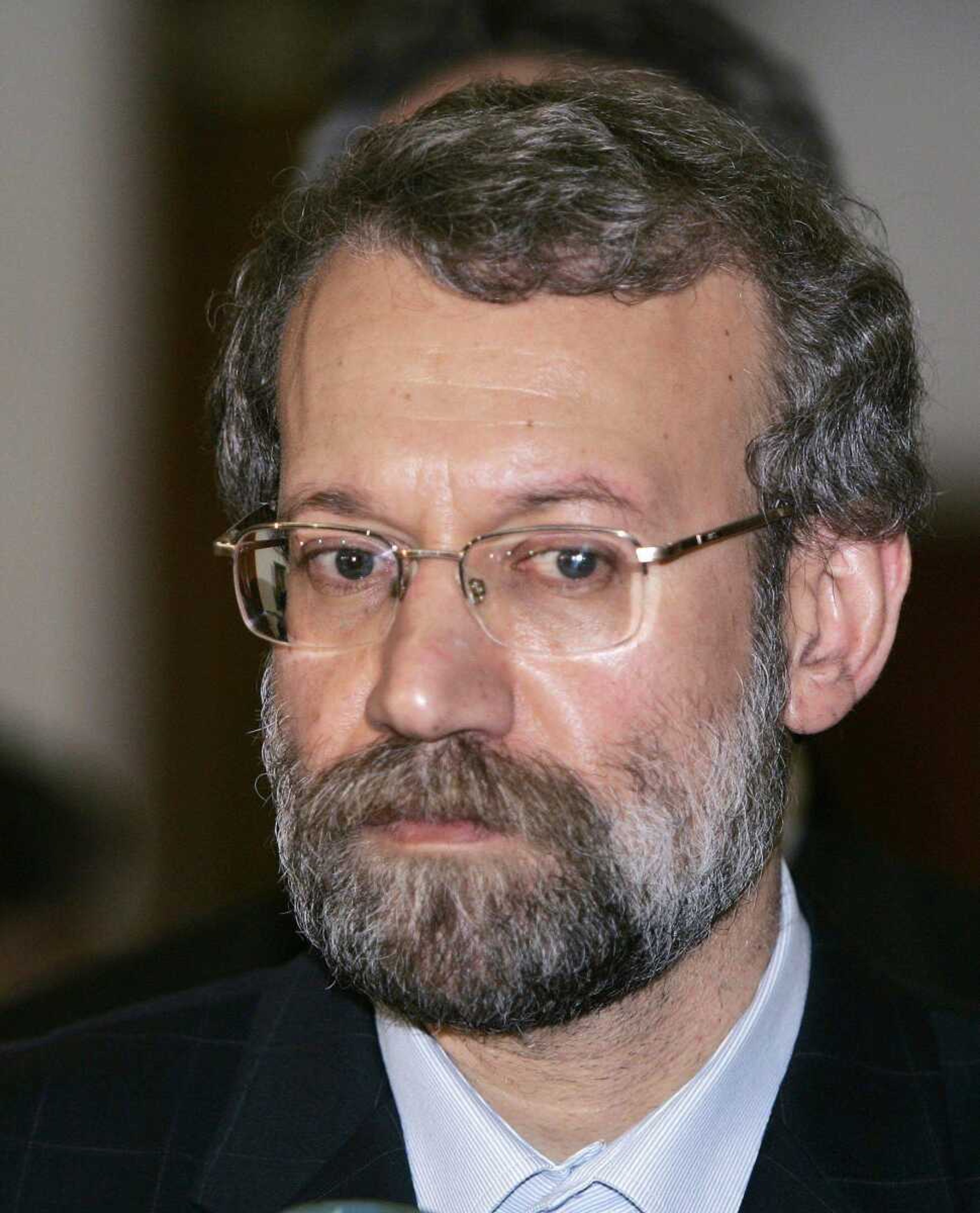Iranian nuclear envoy resigns; could signal hardening stance in atomic dispute
TEHRAN, Iran -- Iran's top nuclear negotiator resigned Saturday in a move seen as a victory for the hardline president that could push the country into an even more defiant position in its standoff with the West. Ali Larijani was viewed as more moderate than President Mahmoud Ahmedinejad, and the two often clashed over how to negotiate with the world on the nuclear issue...
TEHRAN, Iran -- Iran's top nuclear negotiator resigned Saturday in a move seen as a victory for the hardline president that could push the country into an even more defiant position in its standoff with the West.
Ali Larijani was viewed as more moderate than President Mahmoud Ahmedinejad, and the two often clashed over how to negotiate with the world on the nuclear issue.
His resignation and replacement by the little-known deputy foreign minister for European and American affairs, Saeed Jalili, puts the nuclear portfolio firmly in the president's hands just days before a key meeting with European negotiators.
It was not clear whether Larijani left his post under pressure, but his departure was interpreted by many here as giving Ahmadinejad a free hand in dictating his views to the less experienced Jalili.
Government spokesman Gholam Hussein Elham gave no specific reason for the resignation other than to say Larijani wanted to focus on "other political activities."
"Larijani had resigned repeatedly. Finally, the president accepted his resignation," Elham told reporters.
The United States and some of its allies accuse Iran of secretly trying to develop nuclear weapons and have demanded it halt uranium enrichment, a key step in the production of atomic weapons. Oil-rich Iran says its program is for peaceful purposes including generating electricity.
Iranian political analyst Jahanbakhsh Izadi said the intense rivalry between the president and Larijani, who answered directly to Iran's supreme leader Ayatollah Ali Khamenei, was behind the resignation.
"Larijani had become frustrated with Ahmadinejad's rhetoric. The two didn't share identical views on how to deal with the outside world," he said.
Larijani believed a political solution to the standoff was possible and worked closely with European Union foreign policy chief, Javier Solana. His efforts were often hindered by Ahmadinejad's fiery rhetoric, said Ismail Gerami Moghaddam, a reformist lawmaker.
"Larijani's talks with Solana were promising and could have led to a political settlement, but Ahmadinejad and his group are seeking adventurism and didn't want talks to succeed," he said.
The move also suggests that the nation's ultimate arbiter, Khamenei, has tilted toward Ahmedinejad and away from his former protege Larijani.
Iran has periodically raised alarms over the possibility of war, particularly when the West brings up talk of sanctions over Tehran's rejection of U.N. Security Council demands that it halt uranium enrichment.
On Saturday, Gen. Mahmoud Chaharbaghi, the missile commander of Iran's Revolutionary Guards Corps, said the country was capable of firing 11,000 rockets into enemy bases within a minute of any attack.
Chaharbaghi did not specifically identify the bases or the enemy and did not refer to archfoes Israel or the United States by name.
But the U.S. has 160,000 troops in Iraq, another 60,000 in Mideast waters and the Persian Gulf and 24,000 in neighboring Afghanistan.
Elham said Iran's policies would not change and the meeting between the nuclear negotiator with Solana, scheduled for Tuesday in Rome, would still take place.
Solana's spokeswoman Cristina Gallach, also confirmed that meeting would go ahead, "regardless who is the negotiator." But she said Larijani and Solana "had a good working relationship, even though they have not been able to move very far."
John Bolton, the Bush administration's former point man on the Iran nuclear issue, said Larijani's resignation was "a clear victory for Ahmadinejad" and shows that "the leadership is determined to continue with nuclear program" including uranium enrichment.
Bolton said the conflict between Larijani and Ahmadinejad is "part of the larger struggle for power after Khamenei dies."
Ahmadinejad was elected president in 2005 and appointed Iraqi-born Larijani, a former Revolutionary Guards Corps commander and a close ally of Khamenei to replace Hasan Rowhani, considered a moderate. Ahmadinejad had accused Rowhani and his team of technocrats as weak and claimed they made too many concessions in nuclear talks with European nations.
After Larijani was appointed, Iran took a more defiant approach to its nuclear program. It resumed uranium enrichment activities, prompting resolutions by the U.N. Security Council imposing sanctions on Iran in December 2006 and in March.
In 2006, Larijani rejected Western economic incentives in return for a suspension of Iran's nuclear program, saying the Security Council "should not think that they can make us happy with candies."
However, differences between Larijani and Ahmadinejad were revealed earlier this year when Larijani became upset after the president contradicted him on whether Iran would attend a meeting in Egypt to discuss Iraq.
Before he was appointed, Larijani was the head of Iran's state-run radio and television network and was seen as one of the hard-liners' most effective weapon in curtailing former President Mohammad Khatami's democratic reforms.
-------
Associated Press writer George Jahn contributed to this report from Vienna, Austria.
Connect with the Southeast Missourian Newsroom:
For corrections to this story or other insights for the editor, click here. To submit a letter to the editor, click here. To learn about the Southeast Missourian’s AI Policy, click here.










